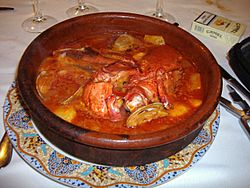Pira caldo facts for kids
 |
|
| Type | Fish soup |
|---|---|
| Place of origin | Paraguay |
| Main ingredients | River fish (mandi'y, tare'y), fat, onions, tomatoes, green or red bell peppers |
Pira caldo is a yummy fish soup from Paraguay, a country in South America. The name "Pira caldo" comes from the Guarani language. In Guarani, "Pira" means "fish." This soup is a very important part of Paraguay's traditional food. It's known for being hearty and full of energy.
Why Pira Caldo is Special
This soup has a lot of calories and protein. This is because of what happened after the Paraguayan War (from 1864 to 1870). After the war, food was hard to find. So, daily meals had to be very filling and packed with nutrients.
Margarita Miro Ibars, who studies Paraguayan food history, said that "all Guarani groups ate a lot of fish. They made fish meals often. Fish was their main source of protein. They also ate game hens, like those in Spain, and many wild animals."
What's in Pira Caldo
Traditionally, the fish used for pira caldo are smaller river fish. These include mandi'y and tare'y, which are types of armored catfish. Other things that go into the soup are fat, onions, tomatoes, green or red bell peppers, parsley, pepper, other spices, and salt.
How to Make Pira Caldo
The most common way to make pira caldo starts with frying the vegetables. You use a little beef or pork fat for this. Then, boiled water and the fish are added. Salt and spices are mixed in too. When the fish is cooked and the soup gets thick, some chopped chili pepper is added for extra flavor.
Since pira caldo is a very popular dish, there are many ways to make it. One way makes the soup a great source of protein. In this method, the cooked fish is put through a small mill. This helps to break up the fish and makes sure small children won't choke on any bones.
See also
 In Spanish: Piracaldo para niños
In Spanish: Piracaldo para niños
 | Kyle Baker |
 | Joseph Yoakum |
 | Laura Wheeler Waring |
 | Henry Ossawa Tanner |

